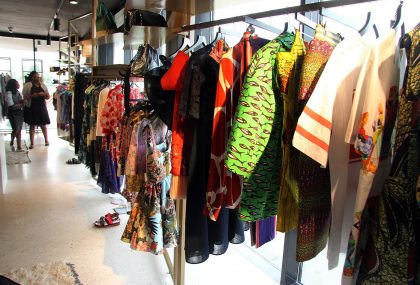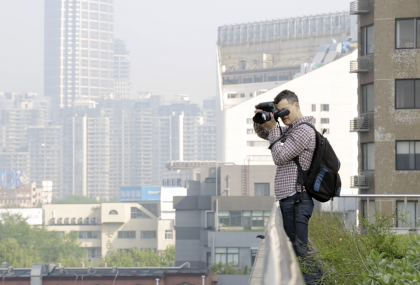Tipping etiquette around the world
Amelia Murray
Finance journalistAvoid money mistakes and bill-time blushes with the smart traveller’s guide to tipping the world over
The origin of the service charge is a hazy one. Some track its beginnings to 17th-century England, where British coffeehouses laid out coin bowls “to insure promptitude” – Early Modern tip jars if you will. Some date it earlier in England, where good-willed masters gifted servants coins, or grand country houseguests left a supplement for the staff of their host. However we got here, tipping is now globally pervasive, and varies hugely from country to country; there’s no “one-size-fits-all” gratuity etiquette – upping the stress-factor of international travel. Of course, at the end of the day, it’s your money and your choice, but to avoid embarrassing underpayment, unnecessary overpayment or causing all-out offence abroad, bear these international tipping tips in mind before you settle your bill.
USA and Canada
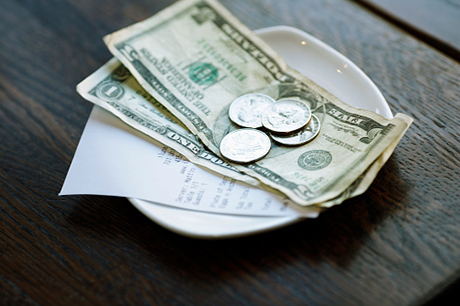
The United States is a country of tippers; many hospitality workers rely on tips to supplement low wages, and can get pretty feisty if you don’t act accordingly. It’s customary to leave a tip for good service, whether you’re dining in a restaurant, grabbing drinks at a bar or even ordering takeaway, while housekeeping, hairstylists, taxi drivers and baristas all hope for a small gratuity for a job well done. Canada follows suit, mimicking US tipping etiquette almost exactly.
Eating and drinking: In restaurants, 15-20% is standard, while exemplary service may receive more and few patrons dare to refuse entirely. In bars, an extra dollar per drink is the norm, unless opening a tab, in which case standard restaurant tipping applies. It shouldn’t be necessary to tip with your coffee or snack to go, however.
Hotels: It’s considered good manners for hotel guests to leave a small tip of appreciation for housekeeping. Generally, think $3-5 per night, going up to $10 in high-end hotels. Gratuity is typically included on the bill for room service.
Taxis: Expect to round up your fare, then give a few extra dollars as well – anywhere from 10-15% in all.
Asia
Tipping in Asia can be a minefield. In many countries, your well-meant tip can be considered rude, so err on the side of caution. China and Japan operate on a fairly strict “no tipping” policy across the board, whereas Thailand, Malaysia, the Philippines, Cambodia and Vietnam are a little more flexible. While practices may be changing in tourism sectors, locals have firmly held customs. If you feel you’ve received excellent service, you may give a small tip in an envelope and hand it directly to a person, but even then it may be refused.
Eating and drinking: Never tip in Japan or China; it may be taken poorly, plus good service is meant to be standard. The exception to this rule in Japan is the “kokorodzuke,” which is given on arrival, before service begins, as if to say “thanks in advance.” Remain cautious, however, and always hand money over in an envelope. Elsewhere, 5-10% tips are customary in Hong Kong, Thailand, Singapore, Malaysia and the Philippines (although if on the bill, there’s no need to pay over), and optional in Cambodia and Vietnam. Tipping at bars and pubs is rare across the board.
Hotels: High-end hotels in China and Japan may be more inclined to accept small tips because the establishments are frequented by tourists, but may still politely refuse. Elsewhere, leaving or giving a small tip in an envelope is optional but not expected.
Taxis: In most areas, rounding up the fare is optional, but taxi drivers in Brunei, Malaysia, Singapore, Japan and China will more often than not refuse tips, as they’re either prohibited or it’s not common practice. Indonesian taxi drivers appreciate a 10% tip.
Europe
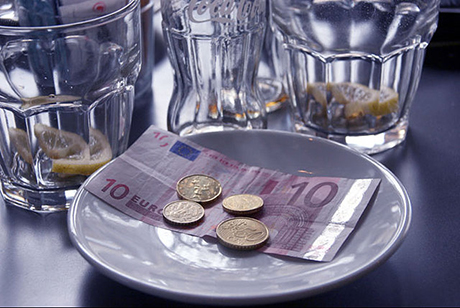
Although this too differs across the continent, Europeans largely view gratuity as an extra: not obligatory, nor even an expectation in many cases. While some restaurants across Europe add a gratuity charge to the bill, it’s typically left up to the customer, where no more than 10% should be fine – preferably in cash. In bars and taxis, general practices vary, but no matter where you travel to in Europe, a small tip won’t be viewed as an insult, so tip to your heart’s content.
Eating and drinking: In tourist hotspots and high-end restaurants (where you can always expect to tip more) you’re more likely to find gratuity added to the bill – especially in the UK where tipping practice is more ingrained, and 12.5% common. It’s not necessary to tip more, but cash tips ensure servers see their share. If there’s no service charge, 10% is standard, but in Greece, Spain and Switzerland, upwards of 5% is often fine – again rising in higher-end restaurants. In parts of northern Italy, tipping in restaurants isn’t encouraged, but if you’re discreet there’s usually no harm; while in Icelandic restaurants, a service charge may be added to the bill, but to exceed this amount is simply not normal custom. Do not expect to tip in bars without table service, while rounding up in bars and cafés with table service is fine.
Hotels: Iceland and the majority of Scandinavian hotel staff don’t require tips. Elsewhere, plan to leave €2-5 (or the local currency equivalent) for housekeeping per night.
Taxis: In most European countries (from the UK to the Baltics), rounding up your taxi fare is viewed as polite and plenty, though not expected all over. France and Germany are keen to reward taxi drivers, whereas inItaly, Iceland and Scandinavia taxi drivers expect exact fare. In Russia, negotiate the fare prior to departure and don’t worry about tipping.
United Arab Emirates
The UAE has largely adopted western tipping practices, so what may apply in the United States often applies here – think a slightly lower percentage, but infinitely more people to consider. Service charges may be added to the bill (plus, in some cases, a tourism fee), although the final gratuity is down to the customer’s discretion, while spa staff, hairdressers, petrol pump attendants and supermarket bag handlers all appreciate a small tip.
Eating and drinking: A service charge is likely to be added to your bill. Even in this case, many diners prefer to leave an additional 10% in cash, directly to the waiter. If there’s no amount stipulated, 10-15% is comfortable, more for exceptional service. Tipping in bars is discretionary, though many are attached to smart hotels, so a tip for table service is fitting.
Hotels: A small cash tip can be given directly to the housekeeping staff per night of your stay.
Taxis: Rounding up to the nearest note is standard, but exact fare is also acceptable. Taxi drivers will not ask for a tip so be sure to instruct your driver that they can keep the change.
Central and South America
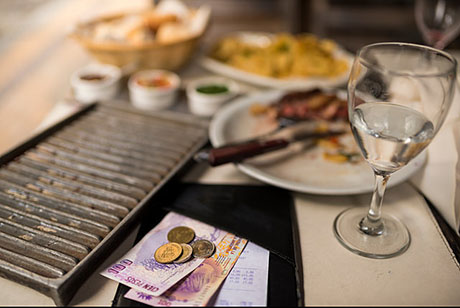
Unsurprisingly, tipping etiquette differs across South and Central America, but a general rule of thumb is to expect to tip around 10% and know that tips are widely appreciated in all countries; while locals may not tip, expectations for tourists can differ. It’s also wise to carry around extra cash for tour guides, drivers and other staff members in the tourism industry. In lesser-developed areas, be sure to carry change, as some countries do not or will not break bills, and always tip in the country’s currency – it’s easier to spend.
Eating and drinking: In Brazil, Costa Rica, Chile and sometimes Colombia, a 10-12% gratuity is typically added to the bill. In other countries, check for a gratuity charge and, in the absence of one, aim to leave a minimum of 10%. Brazil and Mexico prefer patrons to leave tips discreetly, sometimes via an envelope. It’s not unheard of to pay more on top of the gratuity, but don’t exceed 20% – Colombia expects this, Costa Rica treats it as a nice surprise.
Hotels: It’s customary to leave a small tip (the equivalent of a couple of euros or dollars) for hotel cleaning staff per night, or cumulative at the end of your trip, but it’s best to leave the tip in an envelope marked for the cleaners, hand it to them in person, or drop it off at the front desk with instructions to give to housekeeping.
Taxis: In some countries, like Peru, taxi fares are negotiated between the driver and rider, so tips are not necessary. However, for standard taxi rates, rounding up the total is generally enough.
Australia and New Zealand
Decent wages means tipping is purely voluntary in both Australia and New Zealand, and also a relatively new practice – you might round up a bar bill or leave a few coins, but it isn’t necessary. In fact, in some instances your tip may be refused, like in more-reserved New Zealand. But don’t fret; a refusal isn’t intended to be rude, and a simple thank you is an appropriate response.
Eating and drinking: 10-15% is usual in restaurants. Some may add a service charge, so check first. You can’t guarantee the gratuity will go to your waiter (it may go to the owner or be split between all servers), but cash helps. Generally, tipping here is about the service, and you’re not obliged to pay the service charge if it’s added automatically and you’re not happy. In bars, tipping is rare.
Hotels: 1-5 Australian or New Zealand dollars is appropriate to leave per night for hotel housekeepers, depending on how messy you are!
Taxis: Rounding up your fare and/or adding an extra dollar or two for good service is standard.
Africa
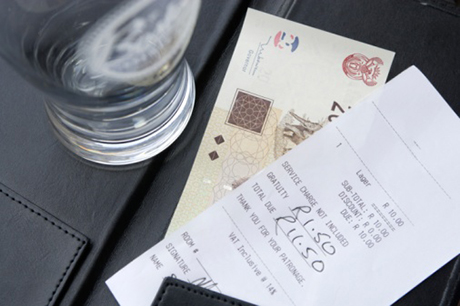
Tipping here isn’t a mandatory practice, but a small token of appreciation, usually a small sum of cash handed over discreetly, is welcome. Experts encourage tippers to stick to the old “cash-in-palm-handshake” to transfer the money, which should be in local currency and small bills. Regardless of who you’re tipping, ensure you give it directly to the person you intend to pay.
Eating and drinking: In tourist hotspots like Morocco or South Africa, check first to see if gratuity has been added to the bill. If not, 10% is considered generous in Morocco, whereas upwards of 10-15% is fine in South Africa. Everywhere else, stick to the 10% rule, and always be sure to tip your waiter personally and discreetly, but definitely express your thanks!
Hotels: A small tip personally given to housekeeping (around R50 per person, per night), concierge or porters is customary.
Taxis: It’s normal practice to round up the total. A small amount extra can be given for particularly helpful drivers.With that on-the-road worry out of the way, you might want to check out our other travel tips articles, from stress-busting travel tech to how to maintain (or achieve) a calm holiday mindset
With that on-the-road worry out of the way, you might want to check out our other travel tips articles, from stress-busting travel tech to how to maintain (or achieve) a calm holiday mindset


